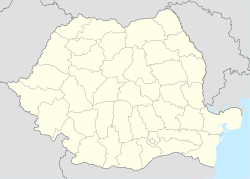Nagyenyed
| Aiud | ||
|---|---|---|
 |
||
|
||
| Location of Aiud | ||
| Coordinates: 46°18′44″N 23°43′45″E / 46.31222°N 23.72917°ECoordinates: 46°18′44″N 23°43′45″E / 46.31222°N 23.72917°E | ||
| Country |
|
|
| County | Alba | |
| Status | Municipality | |
| Government | ||
| • Mayor | Oana Badea (National Liberal Party) | |
| Area | ||
| • Total | 142.52 km2 (55.03 sq mi) | |
| Population (2011) | ||
| • Total | 22,876 | |
| • Density | 203/km2 (530/sq mi) | |
| Time zone | EET (UTC+2) | |
| • Summer (DST) | EEST (UTC+3) | |
| Climate | Cfb | |
| Website | http://www.aiud.ro/; http://www.aiudonline.ro/ | |
Aiud (Romanian pronunciation: [aˈjud]; Latin: Brucla, Hungarian: Nagyenyed, Hungarian pronunciation: [ˈnɒɟɛɲɛd]; German: Straßburg am Mieresch) is a city located in Alba county, Transylvania, Romania. The city's population in 22,876. It has the status of municipality and is the second-largest city in the county, after county seat Alba Iulia. The city derives its name ultimately from St. Giles (Aegidius), to whom the first church in the settlement was dedicated when built.
The municipality of Aiud is made up of the city proper and of ten villages. These are divided into four urban villages and six villages which are located outside the city proper but belong to the municipality. The four urban villages are: Aiudul de Sus, Gâmbaș, Măgina and Păgida. The rural villages are: Ciumbrud (0.81 km²), Sâncrai (0.65 km²), Gârbova de Jos (1.04 km²), Țifra (0.06 km²), Gârbova de Sus (0.52 km²) and Gârbovița (0.28 km²).
As of 2011[update], the total population is 22,876.
The municipality comprises the city proper and the ten villages it administers, in order of population:
The ethnic composition is:
The city is located on the Aiud River valley and therefore has a mountain-type climate. It has a characteristic Transylvanian continental temperate climate. The average winter temperature is −2.6 °C (27 °F) and the average summer temperature is 19.2 °C (67 °F).
Education infrastructure in Aiud is very good for a city of its size. There are many schools, with many students, due to fact that it is renowned as the education hub for the area, with students pouring in from other communities in the area. The first school was opened in Magina in 1611, with Romanian language courses. Today, the following educational institutions operate in the municipality:
...
Wikipedia


